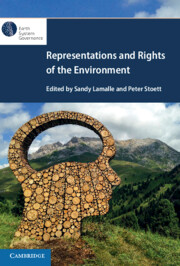Book contents
- Representations and Rights of the Environment
- Series page
- Representations and Rights of the Environment
- Copyright page
- Dedication
- Epigraph
- Contents
- Illustrations
- Tables
- Contributors
- Preface
- Acknowledgements
- 1 An Introduction
- Part I Challenges
- Part II Recollection
- 6 Traditional Indigenous Knowledge and the Relationship to Mother Earth
- 7 The Encyclical Letter Laudato si’ of Pope Francis
- 8 Persons, Things and Nature in Roman Law
- 9 Environmental Law
- Part III Perspectives
- Index
- References
6 - Traditional Indigenous Knowledge and the Relationship to Mother Earth
from Part II - Recollection
Published online by Cambridge University Press: 16 March 2023
- Representations and Rights of the Environment
- Series page
- Representations and Rights of the Environment
- Copyright page
- Dedication
- Epigraph
- Contents
- Illustrations
- Tables
- Contributors
- Preface
- Acknowledgements
- 1 An Introduction
- Part I Challenges
- Part II Recollection
- 6 Traditional Indigenous Knowledge and the Relationship to Mother Earth
- 7 The Encyclical Letter Laudato si’ of Pope Francis
- 8 Persons, Things and Nature in Roman Law
- 9 Environmental Law
- Part III Perspectives
- Index
- References
Summary
Anishinabe and Mohawk traditional knowledge keepers share their testimony on the crises we are facing today and the choices we need to make for our relationship with Mother Earth. They shed light on traditional principles and prophecies, and on the path towards reconciliation, balance and peace. Grandmother Marie-Josée Tardif, a leader in Anishinabe cultural and spiritual revitalisation talks about restoring the balance with the feminine and our being human. She highlights the role of spiritual traditions and religions in addressing current global challenges. Grandfather T8aminik Rankin, Anishinabe Hereditary Chief and medicine man, who survived the residential schools and led the way towards reconciliation, talks about healing our relationships and walking on the path of reconciliation with ourselves, with other beings and with Mother Earth. Grandfather Ka’nasohon Kevin Deer, a Mohawk faith keeper, leader in Iroquoian cultural and spiritual revitalisation, talks about the necessary change in consciousness to see, to hear and to speak differently, and about the path of the peacemaker.
Keywords
- Type
- Chapter
- Information
- Representations and Rights of the Environment , pp. 147 - 159Publisher: Cambridge University PressPrint publication year: 2023
References
- 1
- Cited by

